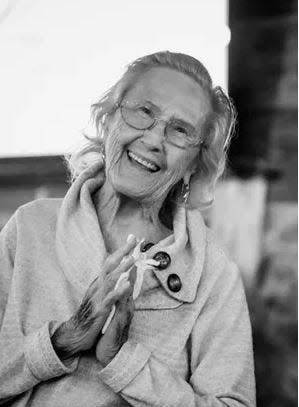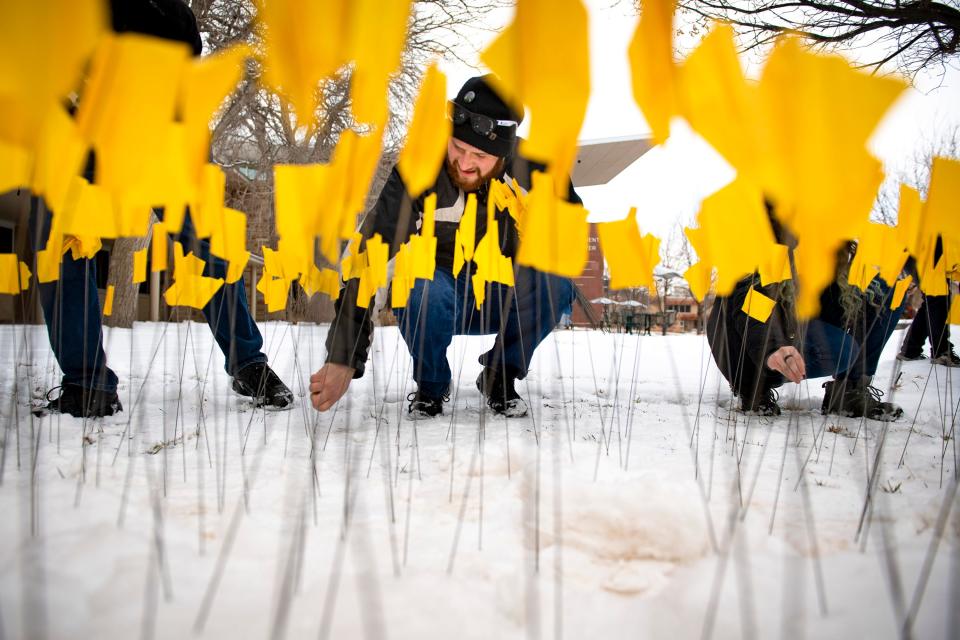Auschwitz survivor Esther Basch to speak at CSU's Holocaust Awareness Week
World events have made the telling of the horrors of the Holocaust more important than ever, and time is running out to hear the stories of survivors in person.
That’s why a 96-year-old survivor, who was taken to Auschwitz on her 16th birthday, is coming to Colorado State University to share her story during the school’s annual Holocaust Awareness Week.
“It’s very, very important to me, especially in these days when antisemitism is rising,” Esther Basch said Wednesday. “… I just feel very strongly that this should never, never happen again, and this is why whenever they ask me to go, I go.”

Basch, who lives in Prescott, Arizona, with her daughter, Rachel Basch Turet, will make the trip to Colorado next week for a pair of appearances Wednesday, Feb. 21, including a 7 p.m. talk in the Main Ballroom at CSU’s Lory Student Center. Her talk is free and open to the public, as are all scheduled events in the Holocaust Awareness Week. Doors open at 6 p.m., with open seating. No bags will be allowed. The event will also be livestreamed on YouTube.
“We all need to listen to these people who have been through hell on Earth tell their stories," said Rabbi Yerachmiel Gorelik, faculty adviser for Students for Holocaust Awareness Week at CSU. “When you look at what’s happening in the world, the message is all the more poignant and critical to share. The focus of the event is to highlight unity, love, hope; that’s what we need.
“As much as we commemorate those who were murdered in the Holocaust, the Jewish message is to always take darkness and create as much light as possible.”
More: Holocaust survivor Sara Moses to share story at CSU that Anne Frank didn't live to tell
Basch said she never saw her parents again after being loaded onto a railroad cattle car on her 16th birthday to be taken to Auschwitz, a camp in Poland where more than 1.1 million Jews lost their lives, according to the online Holocaust Encyclopedia. Her parents both died during the Holocaust.
But the lessons they taught her still guide her to this day, in her dreams and her actions, she said. It’s why her talk will be as much about love, hope and forgiveness as the atrocities she witnessed.
“I follow my parents, what they taught me,” she said. “I don’t even have a picture of them, nothing. But they taught me to be good. Do everything good, don’t do anything bad. Love all people, regardless of race or religion. Love God, forgive, think positive and you’ll have a very happy life.
“This is how I live my life today.”
Basch spoke to 100 high school students at a museum Tuesday in Arizona and at a halfway house Wednesday, her daughter said. She’s scheduled to speak at an event in Montana after her Colorado stops next week and at a juvenile detention facility back in Arizona in a couple of weeks.
More: Colorado's oldest Holocaust survivor dies at 101
Any money Basch receives for her public speaking appearances goes to production costs for a documentary on her life, “The Honey Girl,” scheduled to be released this spring. Rachel Basch Turet is an executive producer of the documentary that focuses on her resilience, tolerance and forgiveness.
CSU’s Holocaust Awareness Week begins at 1 p.m. Friday, Feb. 16, with the placing of a Field of Flags on the Lory Student Center Plaza. Lauren Maskus, president of Students for Holocaust Awareness Week at CSU, said each flag represents 5,000 victims.

Flags of different colors will represent different groups, she said, recognizing that the genocide by Germany’s Nazi regime that killed 6 million Jews before and during World War II, according to the Holocaust Encyclopedia, also was responsible for the deaths of Polish civilians, Jehovah’s Witnesses and others.
“Even though we, as Jewish people, were the biggest victims, we were not the only ones,” she said. “It’s not fair for us to not actively commemorate those who died alongside us.”
The flags will fly throughout the week. Victims’ names will be read aloud from 10 a.m. to 2 p.m. Monday through Thursday on the plaza or just inside the student center in case of inclement weather.
Other events include:
A screening of the movie “The Windermere Children” at 7 p.m. Monday, Feb. 19, in the Lory Student Center Theatre.
A talk on “Couriers, Book Smugglers, and Song Writers: Modes of Jewish Resistance During the Holocaust” by Dr. Deborah Yalen, CSU associate professor and member of the university’s Advisory Council for Jewish Inclusion, followed by a discussion and translated samples of some of the music from noon to 2 p.m. Tuesday, Feb. 20, in Room 386 at the student center.
A memorial and walk during the taking down of the Field of Flags at 1 p.m. Friday, Feb. 23.
Students of Holocaust Awareness Week hosts the event annually. Co-sponsors include Associated Students of CSU, Chabad, Hillel, Lory Student Center, Residence Hall Association, the CSU Advisory Council for Jewish Inclusion, International Programs, AEPi fraternity, SAEPi sorority and the Kaplan family.
More: 'She is famous': CSU's Amy Parsons is a new kind of university president
“Unfortunately, this week is so important because — I hate to admit it — but my generation does not know what the Holocaust is or was,” Maskus said. “So many of us know, ‘Oh, the Holocaust? People died. Or Jews died,” and they don’t realize that it’s this interconnected horror.
“Our goal is to make sure that the survivors, the victims, the people that we lost, can still continue to be recognized, memorialized even. It’s a shame that we have to do it.
“You don’t have to be Jewish or someone who was connected to the Holocaust to come to this event. It’s for everyone.”
Reporter Kelly Lyell covers education, breaking news, some sports and other topics of interest for the Coloradoan. Contact him at kellylyell@coloradoan.com, twitter.com/KellyLyell or facebook.com/KellyLyell.news.
This article originally appeared on Fort Collins Coloradoan: Holocaust survivor Esther Basch to speak at Colorado State University

